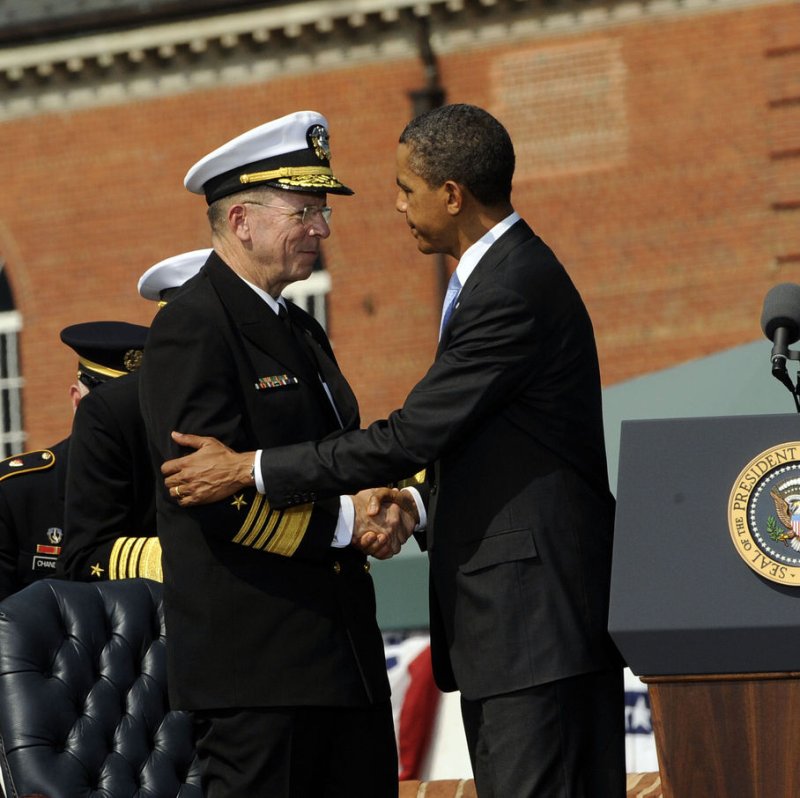US President Barack Obama shakes hands with Adm. Mike Mullen during the Armed Forces Farewell Tribute and Swearing-in Ceremony in honor of the 17th and 18th Chairman of the Joint Chiefs of Staff, at Fort Meyer, on Friday, September 30, 2011, in Arlington, VA. UPI/Leslie E. Kossoff/POOL |
License Photo
WASHINGTON, Oct. 5 (UPI) -- Last Friday, at the retirement ceremony of U.S. Joint Chiefs Chairman Adm. Mike Mullen, U.S. President Barack Obama began his valedictory remarks expanding on the news flash that U.S.-born Yemeni cleric Anwar al-Awlaki had been killed by a U.S. airstrike.
In what would be a well-deserved tribute to the admiral, the president also reminded the audience of the successful mission four months earlier that brought Osama bin Laden to justice in Abbottabad. Of course, the al-Qaida leader wasn't an American citizen and in any event one would have thought that nearly 100 percent of all Americans approved of both outcomes.
That said, executing a U.S. citizen through extra-legal procedures that call into question due process as guaranteed by the U.S. Constitution isn't trivial however justified the reasons for action.
The government's case to kill Awlaki, and this applied to George W. Bush's administration as well, rested on established international and domestic law permitting self-defense and Congress's authorization to use military force passed in September 2001 following the attacks on the Twin Towers and the Pentagon on 9/11. Section 2, subparagraph (a) of that measure authorizes the president to act against states or individuals "to prevent future acts" of terrorism.
Still, the precedent of targeting a U.S. citizen is an important one with potentially profound consequences. As is well known, successive presidents, going back to Gerald Ford, have signed executive orders forbidding assassination of foreign leaders. And since September 11th, the United States has organized hunter-killer teams -- first in Iraq and Afghanistan and now possibly in Yemen -- to track down and eliminate insurgents and terrorists. The use of drones has intensified particularly in Afghanistan and northwestern territories of Pakistan.
But past instances of this type of assassination by the United States have been rare. The most famous was during World War II when Adm. Chester Nimitz authorized the interception and shoot down of Adm. Isoroku Yamamoto's aircraft on April 18, 1943, killing Japan's most formidable sailor. During Vietnam, Operation Phoenix killed thousands of suspected Viet Cong and North Vietnamese agents during that war in a campaign of targeted assassination. Fortunately, none were U.S. citizens and these situations indeed occurred during war.
Today, while surely moral and operational justification for dispatching al Awlaki was powerful and, in a legal sense, permissible, further debate and discussion are important if this precedent isn't unique and thus possibly repeatable.
Suppose for example that future Maj. Nidal Malik Hasans (who is allegedly responsible for the mass killings at Fort Hood, Texas) were identified abroad. Rather than wait for such people to return to the United States covertly and elude arrest, the argument could be made to take them out as imminent threats. This would be even more urgent if such suspects were linked to using weapons of mass destruction. Or if a Pakistani-American was preparing another Times Square or Mumbai-type of bombing that could have precipitated military retaliatory action by the United States or a war between Pakistan and India, would pre-emption be justified?
Extend the logic even further: Would Mexican or Latin American drug lords who were using proceeds from illicit narcotics trafficking to finance terrorist attacks against the United States somehow fall into a category where assassination might be considered? This has been the stuff of many works of fiction and movies. Now, could this become part of real life?
That tough cases make bad law has been a legal aphorism for millennia. So too, no matter the strength of the rationale, killing U.S. citizens raises very real warning flags. No doubt this and any administration will carefully consider each case beginning with the Justice Department and working the findings through the national security process. Appropriate members of Congress likewise almost certainly are part of this process. Yet, both the letter and the spirit and due process should be followed.
Fortunately, preserving both due process and the national security imperative to "prevent future acts" of terrorism can be accommodated. The United States maintains the secret Federal Intelligence Surveillance Act court that is empowered to authorize surveillance on issues of national security that fall outside normal channels. This or another court could be created for actions involving U.S. citizens clearly guilty of conspiring or committing terrorist activities who are beyond the reach of law enforcement.
Congress could also authorize a process to challenge and remove the citizenship of those falling into this category who cannot be arrested or detained by relevant law enforcement agencies here or abroad. And other ways to protect due process in these unique circumstances could be found.
We need to protect due process. We need to defend the nation. Putting in place a better process to do both is crucial.
--
(Harlan Ullman is chairman of the Killowen Group, which advises leaders of government and business, and is senior adviser at Washington's Atlantic Council.)
--
(United Press International's "Outside View" commentaries are written by outside contributors who specialize in a variety of important issues. The views expressed do not necessarily reflect those of United Press International. In the interests of creating an open forum, original submissions are invited.)















